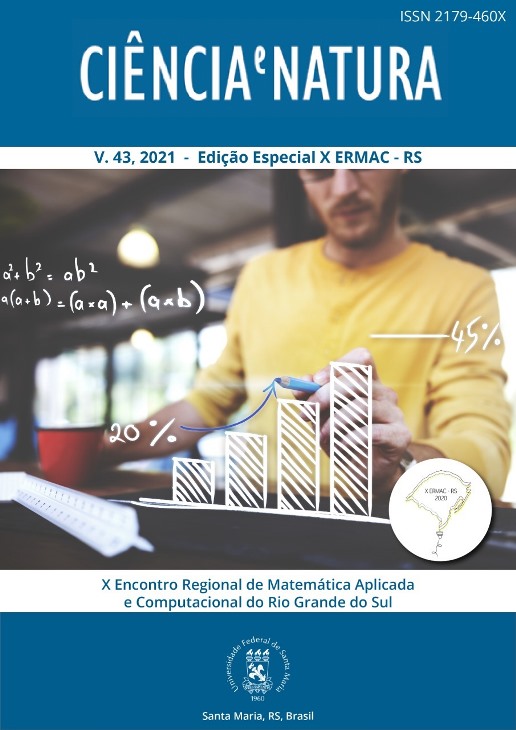Impacto da assimilação de dados de sondagem e radiâncias em evento de ciclogênese
DOI:
https://doi.org/10.5902/2179460X66091Palavras-chave:
Assimilação de dados, WRF, CiclogêneseResumo
Neste trabalho, avalia-se o impacto da assimilação dos dados de sondagem e satélite num caso de ciclogênese(fase inicial de um sistema de baixa pressão ou ciclone), ocorrido no sul do Brasil, no período de 20 a 23 de agosto de 2020. Utiliza-se o pacote de assimilação variacional tri-dimensional implementado no Weather Research and Forecasting Model (WRF3DVar).Os resultados evidenciam que a assimilação tem impacto maior nas primeiras 48 horas de previsão, nos níveis baixos e médios da atmosfera e, que a janela de assimilação de 2 horas centrada na análise, apresenta melhor resultado do que janelas maiores. Conclui-se também, que a matriz de covariância dos erros de previsão (B) gerada com poucos pares de previsão (24h –12h), apresenta resultados piores do que a matriz genérica fornecida pelo pacote de assimilação WRF e que os dados de satélite têm maior impactodo que dados de sondagem na previsão do tempo em escala sinótica.
Downloads
Referências
BARKER, D., HUANG, W., GUO, Y.R., Xiao. Q.N. A Three-Dimensional (3DVAR) Data Assimilation System For Use With MM5: Implementation and Initial Results. Monthly Weather Review, 132, 897-914, 2004.
BARKER, D., HUANG, X. -Y., LIU, Z., AULIGNÉ, T., ZHANG, X., RUGG, S., AJJAJI, R., BOURGEOIS, A., BRAY, J., CHEN, Y., DEMIRTAS, M., GUO, Y. -R., HENDERSON, T., HUANG, W., LIN, H. -C., MICHALAKES, J., RIZVI, S., ZHANG, X. The Weather Research and Forecasting Model's Community Variational/Ensemble Data Assimilation System: WRFDA. Bulletin American Meteorological Society, 93, 831–843, 2012.
COURTIER, P., ANDERSON, E., HECKLEY, W., PAILLEUX, J., VASILJEVIC, D., HAMRUD, M., HOLINGSWORTH, H., RABIER, F., FISHER, M. The European Centre for Medium-Range Weather Forecasting implementation of three-dimensional variational assimilation (3D-Var). Part 1: formulation. Quarterly Journal Royal Meteorological Society, 1783-1807, 1998.
DATA ASSIMILATION SYSTEM FOR USE WITH MM5: Implementation and Initial Results. Monthly Weather Review, 132, 897-914, 2004.
HARTER,F. P.,YAMASAKI,Y., BECK, V. C. Variational Data Assimilation in Chaotic Regime by Lorenz Model. Anuário IGEO, 38, 73-80, 2015.
HARTER, F. P., CAMPOS VELHO, H. F. New Approach to Applying Neural Network in Nonlinear Dynamic Model. Applied Mathematical Modeling, 12, 1-25, 2008.
HOLTON, J. R. An Introduction to Dynamic Meteorology. 4.ed. New York: Academic Press, 2004.
Publicado
Como Citar
Edição
Seção
Licença
Copyright (c) 2021 Ciência e Natura

Este trabalho está licenciado sob uma licença Creative Commons Attribution-NonCommercial-ShareAlike 4.0 International License.
Para acessar a DECLARAÇÃO DE ORIGINALIDADE E EXCLUSIVIDADE E CESSÃO DE DIREITOS AUTORAIS clique aqui.
Diretrizes Éticas para Publicação de Revistas
A revista Ciência e Natura está empenhada em garantir a ética na publicação e na qualidade dos artigos.
A conformidade com padrões de comportamento ético é, portanto, esperada de todas as partes envolvidas: Autores, Editores e Revisores.
Em particular,
Autores: Os Autores devem apresentar uma discussão objetiva sobre a importância do trabalho de pesquisa, bem como detalhes e referências suficientes para permitir que outros reproduzam as experiências. Declarações fraudulentas ou intencionalmente incorretas constituem comportamento antiético e são inaceitáveis. Artigos de Revisão também devem ser objetivos, abrangentes e relatos precisos do estado da arte. Os Autores devem assegurar que seu trabalho é uma obra totalmente original, e se o trabalho e / ou palavras de outros têm sido utilizadas, isso tem sido devidamente reconhecido. O plágio em todas as suas formas constitui um comportamento publicitário não ético e é inaceitável. Submeter o mesmo manuscrito a mais de um jornal simultaneamente constitui um comportamento publicitário não ético e é inaceitável. Os Autores não devem submeter artigos que descrevam essencialmente a mesma pesquisa a mais de uma revista. O Autor correspondente deve garantir que haja um consenso total de todos os Co-autores na aprovação da versão final do artigo e sua submissão para publicação.
Editores: Os Editores devem avaliar manuscritos exclusivamente com base no seu mérito acadêmico. Um Editor não deve usar informações não publicadas na própria pesquisa do Editor sem o consentimento expresso por escrito do Autor. Os Editores devem tomar medidas de resposta razoável quando tiverem sido apresentadas queixas éticas relativas a um manuscrito submetido ou publicado.
Revisores: Todos os manuscritos recebidos para revisão devem ser tratados como documentos confidenciais. As informações ou ideias privilegiadas obtidas através da análise por pares devem ser mantidas confidenciais e não utilizadas para vantagens pessoais. As revisões devem ser conduzidas objetivamente e as observações devem ser formuladas claramente com argumentos de apoio, de modo que os Autores possam usá-los para melhorar o artigo. Qualquer Revisor selecionado que se sinta desqualificado para rever a pesquisa relatada em um manuscrito ou sabe que sua rápida revisão será impossível deve notificar o Editor e desculpar-se do processo de revisão. Os Revisores não devem considerar manuscritos nos quais tenham conflitos de interesse resultantes de relacionamentos ou conexões competitivas, colaborativas ou outras conexões com qualquer dos autores, empresas ou instituições conectadas aos documentos.






